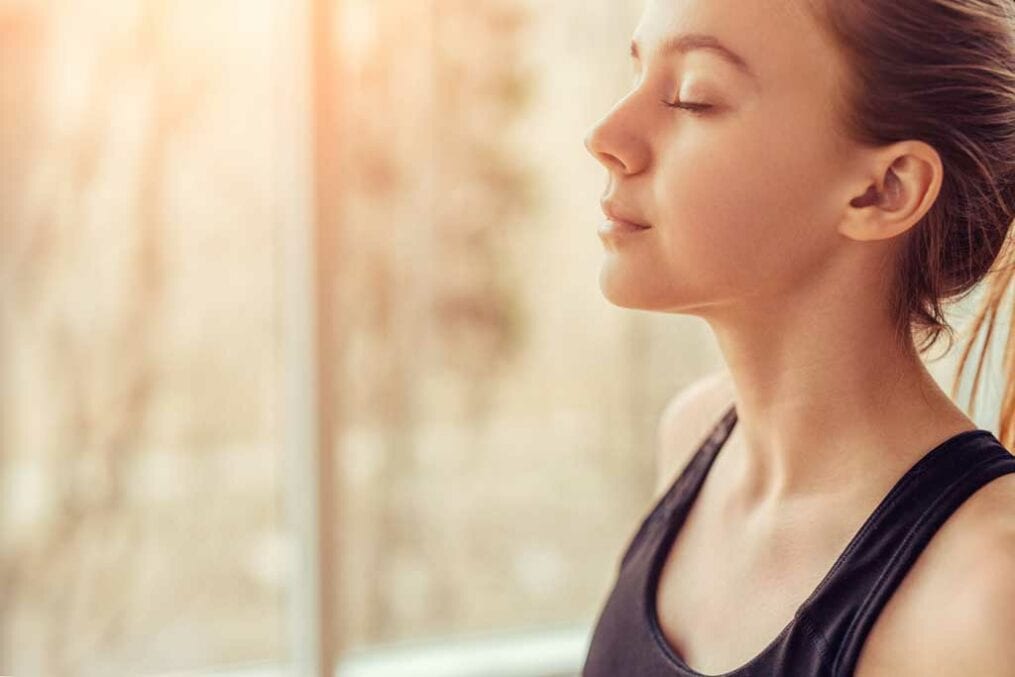Simply by breathing correctly, can you improve your skin? Meet the experts that predict that Breathing Exercises will be the next big thing in beauty.
We do it over 23,000 times a day, unconsciously, and yet breathing, one of our most basic responses, is being heralded as the newest health craze — with particular advantages for beauty. However, how?
While ‘breathwork’ – or pranayama – has been a part of the yogic tradition for millennia, its recent mainstream acceptance in the health and beauty industry means it is now accessible to a whole new audience. Promoted on social media by an increasing number of facialists and bodyworkers touting the benefits of breathwork for beauty – which range from radiant skin to better sleep and hormone control – it seems as if breathwork for beauty is poised to revolutionize our daily routines.

Behind the exhalation
So what is ‘breathing’ precisely, and why bother? ‘The bulk of us do not know how to breathe correctly. Additionally, stress causes us to forget to breathe deeply, ‘says Katie Light, a facialist and creator of the Light Technique. ‘When the breath is continuous and flowing, it assists the body’s organs, cells, and systems to get more oxygen. We feel more anchored and have increased mental clarity. ‘
While many of us have been instructed to take ‘a few deep breaths’ before receiving a facial or massage, this new holistic method goes far further. ‘I begin each treatment with breathing rituals that help my clients release tension, maintain mental clarity, and spiritually reconnect with themselves,’ explains Beata Aleksandrowicz, facial massage expert and creator of the Face Cure, an anti-aging treatment that combines breathwork, touch, and sound healing. ‘Breath serves as a link between the individual I deal with outside and inner worlds, allowing my therapy to be more successful. ‘
While the emerging discipline of psychodermatology examines the effect of mental health on the skin, the idea is that breathwork “un-taps” emotional blockages that appear as physical ailments.
When we are stressed, our skin will reflect it, ‘Light explains. For instance, depending on the individual, sleep deprivation may result in dehydration, acne, or eczema on the skin. When you begin to work with and through your breath, you will notice many beneficial improvements. ‘
Outside of the therapy room, the wellness crowd is becoming aware of the potential of breathwork to transform their energy levels and increase resilience. Richie Bostock, who has a 40.6k-follower Instagram account, got interested in cannabis after researching therapies for his father, who was diagnosed with multiple sclerosis. After a few years, his courses at prestigious fitness clubs are completely booked.
‘How we breathe has a direct impact on our cardiovascular system, endocrine system, digestive system, neurological system, immunological system, and lymphatic system,’ Bostock said. ‘And it is mainly determined by the condition of these that our bodily and mental health is determined.’ It’s a rather persuasive argument. Not to mention, breathwork is available to everyone and (after you’ve learned the fundamentals) completely free.
What is the science behind this?
So how does this all affect the skin? And is there any actual research to indicate that breathwork may have a positive effect on one’s appearance? ‘Our lungs not only provide us with essential oxygen, but also aid in the elimination of poisons from every cell,’ Aleksandrowicz explains. ‘While I can not guarantee that particular diseases will be cured, deep breathing provides an increase in oxygen and nutrients, which has a beneficial impact.’ Light concurs. ‘Breathing properly may have a greater effect on the skin than any topical treatment. It increases the amount of oxygen available to the body and all of its cells. ‘
If this all seems like a huge leap of faith, evidence is accumulating that may offer more insight. Three scientists were given the 2019 Nobel Prize in Physiology or Medicine for their research on how cells ‘adapt to oxygen availability’ and a protein called hypoxia-inducible factor, or HIF, that increases the number of red blood cells in the body during times of oxygen shortage. This may provide insight into the mechanism by which controlling the air for brief durations may promote cell activity-the intended effect of the most sophisticated face creams. Now is the time to inhale deeply.

